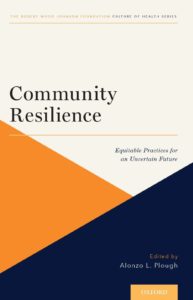Questions about data ethics and inclusive design are more important than ever.
The pandemic emphasized the importance of digital health data, and we expect it will play an increasingly critical role in the future of health. At the same time, we’ve also seen renewed interest in designing for inclusion and advancement of equity.
 A new book by the Robert Wood Johnson Foundation, published in April 2021, arrives at exactly the right moment. “Community Resilience: Equitable Practices for an Uncertain Future,” explores the role of innovation and community engagement in nurturing resilience and promoting health equity. The book includes a chapter contributed by Luminary Labs CEO Sara Holoubek and Camille Nebeker, Director of ReCODE Health and Associate Professor in the Herbert Wertheim School of Public Health at the University of California, San Diego, along with RWJF’s Paul Tarini. Sara and Camille co-hosted a workshop at RWJF’s Culture of Health conference in 2019, and their presentations became the foundation for a chapter titled “Digital Data, Ethical Challenges.”
A new book by the Robert Wood Johnson Foundation, published in April 2021, arrives at exactly the right moment. “Community Resilience: Equitable Practices for an Uncertain Future,” explores the role of innovation and community engagement in nurturing resilience and promoting health equity. The book includes a chapter contributed by Luminary Labs CEO Sara Holoubek and Camille Nebeker, Director of ReCODE Health and Associate Professor in the Herbert Wertheim School of Public Health at the University of California, San Diego, along with RWJF’s Paul Tarini. Sara and Camille co-hosted a workshop at RWJF’s Culture of Health conference in 2019, and their presentations became the foundation for a chapter titled “Digital Data, Ethical Challenges.”
The world of 2021 feels much different than the world of 2019 — but the questions we should be asking about data ethics and digital health equity haven’t changed very much. If anything, these topics are more important than ever. “As vaccines have become an important tool for combating COVID, we’re all getting a refresher on what is or is not covered by HIPAA,” Sara says. “It’s a good reminder for providers, researchers, and health tech ethicists that we have not effectively communicated current practices and existing regulations. It’s also a reminder that context and culture matter: We’ve welcomed telehealth, yet we’re asking valid questions about digital proof of vaccination.”
“What I’ve observed over the past 16 months is that digital health is no longer a novelty or option. Relaxed regulations and innovations in billing allowed for digital strategies to move forward quickly to facilitate access to health care,” Camille says. “What hasn’t changed is that we are still in the ‘Wild West’ of the digital health era. Some progress is being made, but the regulations are not sufficient and continue to be inconsistent across the digital health ecosystem stakeholders.”
Public health organizations are building consensus and working toward the responsible use of data and technology. Last month, the World Health Organization published guidance on ethics and governance of artificial intelligence for health, identifying principles for ensuring public benefit and stakeholder accountability. But it’s not just emerging technologies like AI that are cause for concern. The pandemic emphasized deep inequities in access to even the most basic digital health tools.
“I’ve been working with residents of a retirement community. Many did not have access to the technologies needed to manage during quarantine,” Camille says. “The access gap was attributed to the cost of internet service and, for those on a fixed income, this is critical. For those who did have access to the internet, the usability of the technologies was a barrier. Many did not understand how to use the various services like Zoom. We were able to meet with residents and published our learnings in JMIR earlier this year. The impact on physical and mental health is notable, and these were the people we could access on Zoom! We need to do more now to make sure our seniors are able to utilize technologies prospectively and not wait for another crisis.”
Whether you’re using AI for digital health research or video calls for telehealth visits with seniors, Camille recommends consulting ReCODE Health’s Digital Health Checklist and Framework. The framework consists of four intersecting domains — access and usability, risks and benefits, privacy, and data management — anchored by ethical principles. “As we move forward with more remote care and digital offerings, we must be mindful that design and delivery are inclusive and equitable,” Sara says. “That will require understanding the real needs of patients and providers, considering options for those with varying access to technology, imagining unintended consequences, and thoughtfully applying guidelines and best practices as they evolve.”
Do you have a hunch about digital health, tech ethics, or other topics? What changes have you noticed over the past two years? Add your observations and ideas to RWJF’s Share Your Hunch website.

